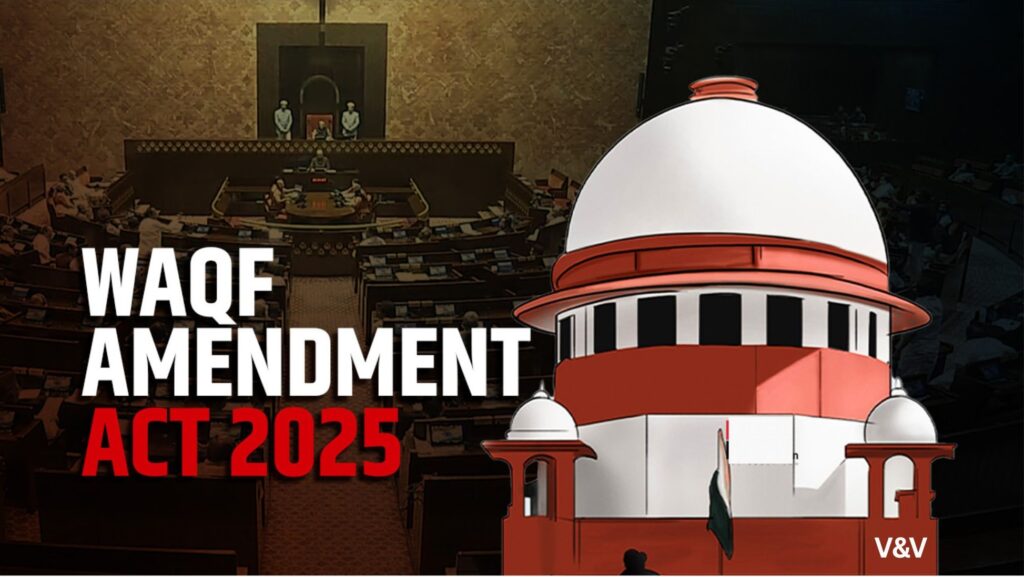In a country where murderers and rapists don’t spend as much time in the courts as much as comedians and statutes, it surely raises certain questions regarding our law-making and judiciary. Religion and politics play a dominant role in India, which made the Waqf Amendment 2025 in the Supreme Court predictable. The dissection of this law is not itself problematic, after all, Articles 13 and 32 must be efficiently used. It’s the idea of the selective urgency regarding this one. Let’s understand the how and why of the whole theatrics of the Waqf Amendment Act 2025.
Waqf Law 1995 Explained: Exploring the Fundamentals of the Law
Waqf is an Islamic charitable endowment, where a person permanently donates movable or immovable property (like land, buildings, or money) for religious, educational, or social welfare purposes, with no intention of reclaiming it. The income arising from such endowments is used for mosques, madrasas (Islamic schools), orphanages and more.
To govern the Waqf properties, the government in 1995 enacted the Waqf Act 1995. The most important provision under the act was the establishment of the ‘Waqf board’ for different states. Each state has a Waqf board which is responsible for the general supervision, administration and protection of all Waqf properties in the state.
As per the provision of the act, a mandatory survey of Waqf properties must be done by the state government. The survey must be conducted every 10 years. The Waqf Act 1995 also explained the role of ‘Mutawalli’ who is the trustee/ manager of the Waqf properties. The role of ‘Mutawalli’ is to provide full details: property, income, intended use, and beneficiaries.
Another important tenet of the Waqf law is the powers of waqf tribunals. The clause was deemed controversial and has been debated a lot in the media. The matters pertaining to the Waqf properties are taken by Waqf tribunals and the decisions are outside the jurisdiction of civil courts. The final decision cannot even be challenged in the higher courts.
Undoubtedly, the Waqf law had faults, including illegal encroachments and a lack of women’s participation. Taking that into account, the parliament introduced the Waqf Amendment Act 2025 in March.
What’s Inside the Waqf Amendment 2025?
While Waqf Amendment 2025 in the Supreme Court might not be on BJP’s bingo card this year, it surely has taken the party by storm despite the passing of the bill with a good majority. However, as soon as it arrived, before being accepted by a public consensus, its constitutionality was challenged in Supreme Court.
Supporters are touting it as ‘progressive’ because it is bringing women’s rights to the forefront which was earlier missing. The act mandates that at least one woman member be on every State Waqf Board. The act is attempting at greater transparency in appointments and functioning. It also ensured the affirmative inclusion of women in governance and women can now be ‘mutawallis’ explicitly under defined conditions.
The act also empowered the Waqf board with legal standing to reclaim encroachments faster. Special tribunals are made more effective. Simultaneously, it strengthened tribunal powers, mandated timelines for verdicts, and added women legal experts to panels.
To deal with the illegal encroachments, a very popular criticism against previous Waqf law, the amendment now made digitization mandatory. It created a national Waqf property database accessible to the public for transparency.
Another significant change that the Waqf amendment brought is the ‘right to appeal.’ The particular clause strips some power from the Waqf tribunal and grants it to the High Court, maintaining the constitutional features of ‘due process of law’ and ‘principle of natural justice’. The act stipulates a statutory right of appeal from the Waqf Tribunal’s decision to the High Court, expanding judicial review and accountability.
Waqf Amendment 2025 Under Fire: Supreme Court Legal Battle
While legal critics have subjected the citizens to multiple objections against the Waqf amendment and its constitutionality, some concerns are more pressing and merit closer examination than others.
To begin with, the lawmakers are accused of hurting the “Essential religious practices’ while framing the law. It is a judicial evolved doctrine used in cases such as this one where the statute deals with religious connotation. If any law is going against the essential religious practice then it must be declared null and void. The practice is thus protected under articles 25 and 26 of the Indian constitution.
The government, however, has defended the Waqf Amendment 2025 in the Supreme Court, by “asserting that the law regulates only the secular and administrative aspects of Waqf institutions without interfering with essential religious practices or beliefs of the Islamic faith.”
The petitioners challenged the constitutionality of the act by citing Article 26, which discusses the rights of religious denominations. The critics argued that stipulations of the Waqf 2025 are opposing the rights mentioned in the Constitution. Thus, the law must be declared null and void.
Religious Autonomy vs. Political Optics
Another debate is about a certain clause of the updated Waqf Act, barring SC and STs of the Muslim population from dedicating property to Waqf as a protective measure. The government’s defense cited that “anyone could assume the role of mutawalli and potentially misuse waqf properties for personal gain.” The clause has been heavily criticised in the Apex Court because it is discriminatory in nature and restricts certain Muslim communities from creating Waqf.
The lawyers advocating against the Waqf Amendment 2025 in Supreme Court are alluding to the failure of the state governments. “Mr. Sibal adds, the onus was on the States to survey Waqf properties since 1954. So far only one State has completed the survey. Whose fault is this? So the community will be deprived because the State governments have not conducted surveys… and now you (government) say unregistered Waqfs will be deprived of their status. This is expropriatory.”
The lack of registration of Waqf properties till 2025 is to be blamed on the State government’s irresponsibility and their utter failure to do their job as countered by Mr Sibal when he was asked by CJI why the properties are not registered despite being mandated in 1923.
Constitutionality Of Waqf Amendment 2025
The final decision of the Waqf Amendment 2025 in Supreme Court is still pending. The decision of whether the act violates the freedom of religious denominations to manage their affairs would perhaps change the course of law-making in this country.
As the Supreme Court examines the Waqf (Amendment) Act, 2025, the challenge lies in balancing administrative reform with constitutional guarantees, a test not just for the law, but for the principles it claims to uphold.
Also read: Caste census to quotas: Is caste becoming a political tool



Pingback: India’s Heatwave Crisis: When Climate, Heath and Governance Collide - V&V
The writer has used the more technical language in her writeup rather than using a language of a laymen . This shall be understood by highly skilled person . It should. Be easily understood by the mass readers easily . There is no doubt that writer has a thorough knowledge of the subject but she expressed her viewa about the wakf amendment act 2025
Pingback: When Will Kali Arrive? The Answer lies Within - V&V